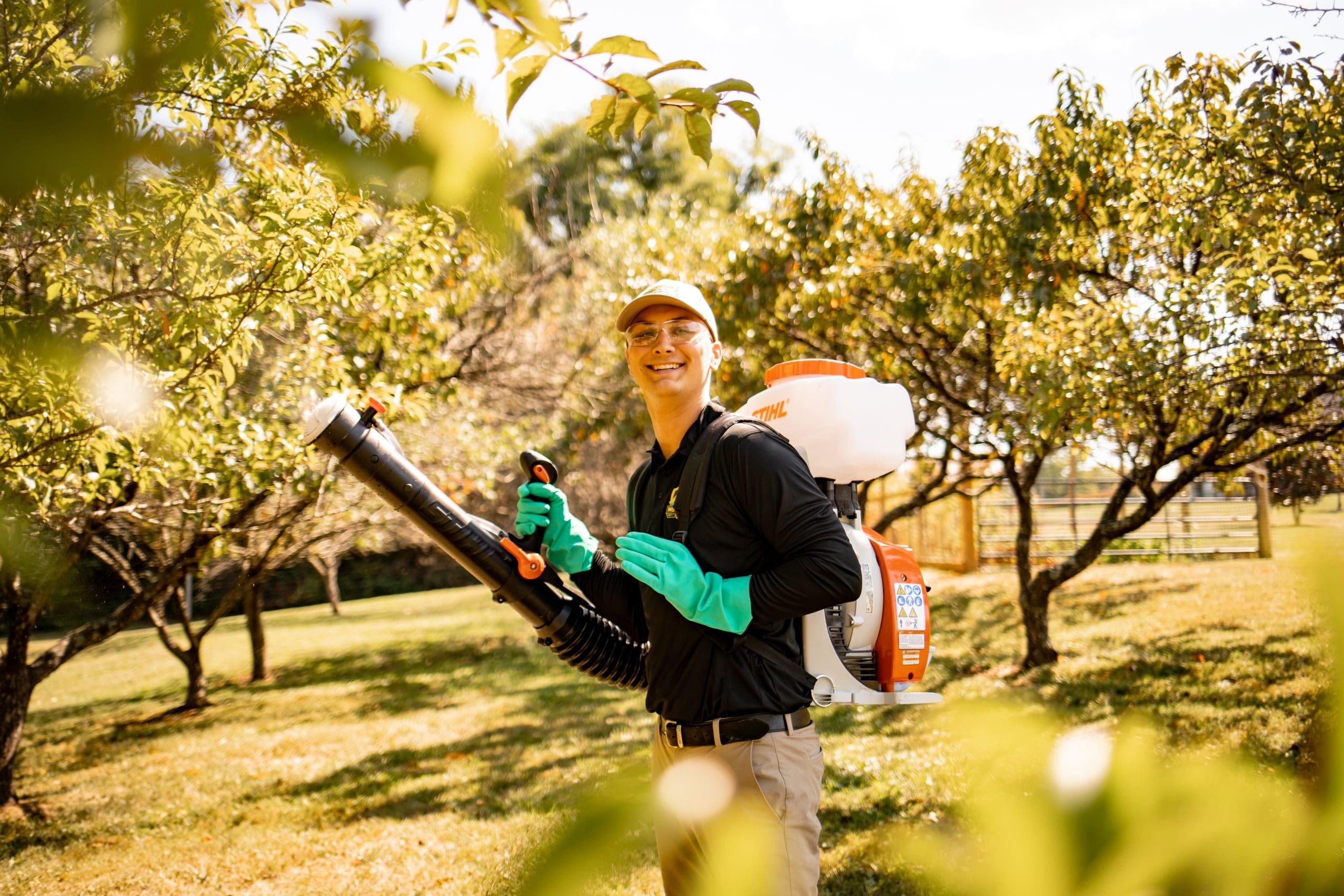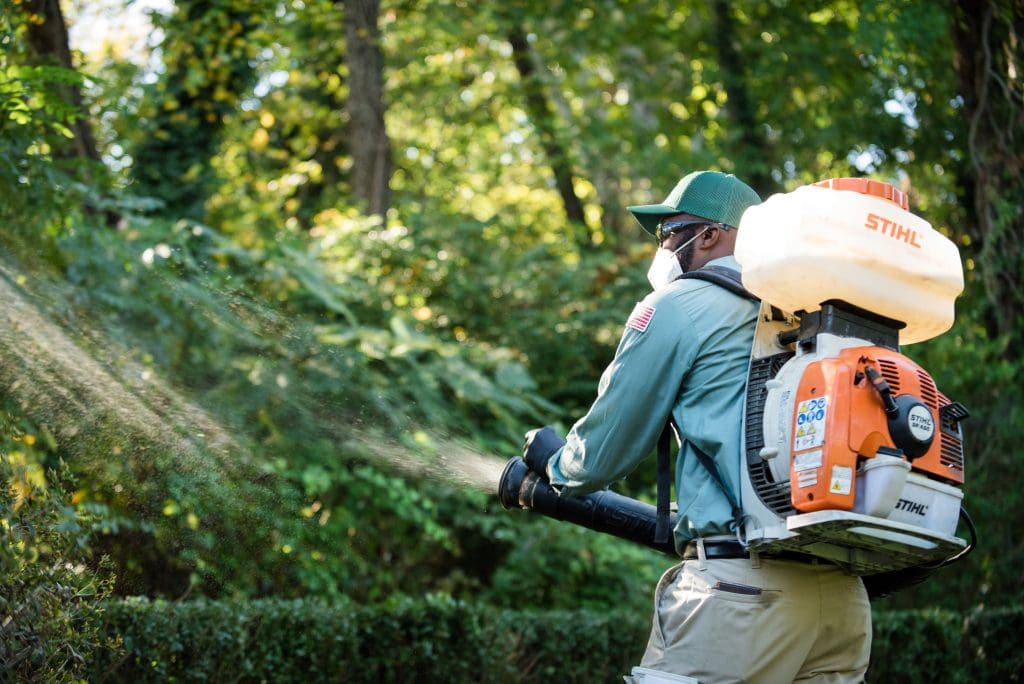
Looking for an additional service line that doesn’t call for a lot of upfront investment and has the potential to make money with existing and new customers? Mosquito control might be an offering to consider.
Weed Man added mosquito control services in 2019 and launched the brand Mosquito Hero in 2020. In the U.S., Weed Man now has 21,000 Mosquito Hero customers and in Canada, they have 6,700. Jen Lemcke, CEO of Weed Man, Mosquito Hero and TurfBot, says their mosquito services have brought in $12 million in revenue this year. She estimates at least half of their Weed Man customer base could become Mosquito Hero customers.
“I feel like for a lawn care company, it’s a good add-on,” Lemcke says. “It lends well to across marketing efforts to your existing customers. Because we’re beautifying the lawn, we want people to spend more time on the lawn; therefore, we want to eliminate the mosquitos to help them be more on the lawn.”
The Benefits
Kevin Seminerio, operations manager for Joshua Tree, based in Stockertown, Pennsylvania, says mosquito control is a simple service line that doesn’t take a lot of equipment or manpower and it is pretty easy to implement and sell.
“Mosquitos are everywhere, so to get somebody on board about reducing that population is pretty easy to get them swayed,” Seminerio says. “The products are not really that expensive. If you’ve put the right program together, it’s a very minimal charge to buy in for a company, equipment-wise. It is a very simple service to get started right away.”

Joshua Tree started offering mosquito control four years ago and now has about 500 clients receiving the service.
“You don’t need a big truck; just a small truck or van would work perfectly, so it’s very easy to add it to lawn care pest control trucks that already exist,” says Brad Leahy, vice president of Blades of Green, based in Edgewater, Maryland.
Leahy says the true benefit of mosquito control for customers is it opens up the ability to enjoy their outdoor space.
“Some people don’t want to spend the money on their landscapes because of the mosquitos and the bugs,” Leahy says. “So when you eliminate that, or give them an option and say, ‘Hey, yeah, you should spend $100,000 on your backyard for landscaping because we can just take care of the mosquitos or there’s a company that we partner with.’”
By offering to control the mosquito population, other landscape elements like a fire feature can become more appealing to clients.
Mosquito control services also provide the public health benefit of controlling mosquitos, which vector diseases like Zika and West Nile virus.
The Drawbacks
While mosquito control is a fairly easy service to implement, it does come with its own set of nuances you need to be aware of. Lemcke says there can be a sticker shock component to selling mosquito control services as it should be sold as another program, like lawn care, rather than a one-off job like aeration.
“If a customer says, ‘I just want one or two services,’ it’s not going to get them to where they need to go,” Lemcke says. “It’s an investment for our customers.”
Lemcke suggests other companies break off the branding of their mosquito services as something separate as not only does it help with marketing efforts, but it can help separate some of the concerns with pricing.
“Instead of saying, ‘Oh, I’m going renew you for lawn care and for mosquito and it’s going to be $1,500,’ you can say, ‘Here is your renewal for this and this the renewal for that,’” Lemcke says.
Depending on your location, mosquito control services are seasonal so finding employees for the job might be more challenging. Leahy and Seminerio use these roles as entry-level positions for their employees.
“That’s probably a big con is you’re training people and then getting new people the following year potentially,” Leahy says.
Weather can also impact your ability to treat and cause you to come back to retreat earlier than planned. Leahy says his technicians have to be aware of and respond properly to wind speeds. He says they’ll also get calls from customers asking them not to treat if there’s a 30% chance for rain.
“Now you got to do everyone else, and it doesn’t rain, and then you got to go back,” Leahy says. “Routing efficiencies can get really messed up with people that want to reschedule due to weather conditions and that just is inefficient for business.”
When it does rain after an application, Leahy says they ask their customers to give it a week or two and if there is an issue, then they’ll come out and retreat.
Getting Started
The first step to launching your mosquito service is having the proper training and a license. Leahy says it is critical to be mindful when spraying the targeted areas.
“You have to be very careful to do a thorough inspection of the property each time because in the spring, there are no herbs out, there are no vegetables out,” Leahy says. “Come to the summertime, you might come back, ‘Oh, I treated this area five times and there’s nothing had been here but now there is. So be extremely cautious and we have some protocols that we have to make sure your back is always to the protected areas.”
Blades of Green trains their employees specifically on what plants getting ready to flower look like so they won’t treat any of them.
There are multiple methods for applying mosquito control products. There are backpack blowers, which Leahy says are very effective at getting the product on the undersides of leaves. Misting systems that can be installed, like an irrigation system, are another option. Granular insect growth regulators and mosquito traps are other strategies.
“I’ve found that there’s multiple choices out there coming,” Leahy says. “We look at it as supplemental. If you have a heavy population, you live in an area where you’re constantly having retreats or service call requests it’s potentially more effective to put in one of these devices to reduce the population so you don’t have to keep coming back and spraying.”
The primary products Mosquito Hero uses are Envu’s Suspend PolyZone and FMC’s Scion. Chris Lemcke, national technical coordinator at Weed Man, says these products are extremely safe and work for up to 75 days. He says these products are used more as a preventative than for knock-down purposes.
Seminerio says they focus on eliminating harbor areas for mosquitos first by getting rid of standing water on the property. He says they also utilize growth regulators and treat harbor areas.
The frequency your crews will have to treat depends on the products you use as well as your region. Lemcke says their franchises tend to do five to six applications a year. She says some locations like Florida, Texas and California can have ten applications as it is a year-round business there.
Joshua Tree goes out to treat every 30 to 45 days. Seminerio says their season is weather based, but they tend to treat from April to November.
Meanwhile, Leahy says their treatment frequency is every 21 to 30 days. Blades of Green also offers an organic version of their mosquito control services, but it requires more frequent treatments every two weeks. Leahy adds that because the organic products are oil-based, they can sometimes burn plants in the summertime.
Selling the Service
All three companies say they cross-sell their mosquito services to existing customers but are also attracting leads from their marketing efforts.
One of the aspects of offering mosquito services is you need to be clear in your messaging that no treatment will eradicate mosquitos from a property entirely. Leahy says using the terms ‘mosquito control’ or ‘mosquito reduction’ are more accurate. Seminerio says setting clear expectations with the client is key. Otherwise, you will be making a lot of service calls.

“When we’re selling it, we’re not selling it as we’re going to get rid of all of your mosquitos,” Seminerio says. “This is to reduce the population to make your home more livable.”
You also want to decide if your company will offer flea and tick control along with your mosquito services. Leahy says for them, it’s a similar product. They just have to treat some areas a little differently so it’s an easy addition.
Joshua Tree also offers flea and tick control as the harbor areas for the insects tend to be the same. Lemcke says they offer flea and tick control under their Weed Man brand.
Tips for Success
Lemcke encourages doing a lot of research and talking to other businesses with experience in the space before jumping in. She says they also dug into the resources the American Mosquito Control Association offers as well.
“You’ve got to realize that it’s not just an add-on,” Lemcke says. “It’s a program. That sticker shock, you have to think that through and how you’re going to market it.”
She also advises making sure you don’t include any wording that guarantees you will eliminate all mosquitos on a property. Lemcke notes that it can be harder to provide the same level of control on certain properties that don’t have the foliage for the product to adhere to. She says it’s important to understand that it may not be a suitable service for your entire customer base.
Leahy says you need to have a great training program and recruiting program if you want to execute this at a high level, as you will constantly be hiring new people because the work is hard and it’s in the summer.
It is also important to always stay on top of the new products coming to market.
“There’s a lot of new methods and new products out there that people should explore to see what fits in their market and their clientele,” Leahy says.
Seminerio agrees you should do research on the products to continue to ensure you’re using the best ones available. He says you should continually train technicians on how to spray safely.
Leahy says they are constantly adjusting their program each year to reduce the amount of products they use while providing a high level of mosquito control.
This article was published in the January/February issue of the magazine. To read more stories from The Edge magazine, click here to subscribe to the digital edition.


